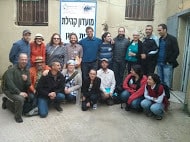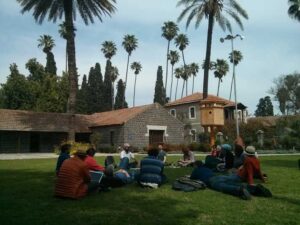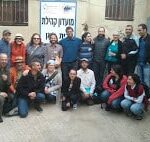by guest author Sara Zebovitz, GariNYC founder and member
 Tonight, we spent some time with residents of Kibbutz Yizreel, a kibbutz built in 1948 and still going strong. My personal connection to this kibbutz is strong – Yizreel was founded by Habonim Dror, the movement I am a product and part of.
Tonight, we spent some time with residents of Kibbutz Yizreel, a kibbutz built in 1948 and still going strong. My personal connection to this kibbutz is strong – Yizreel was founded by Habonim Dror, the movement I am a product and part of.
Kibbutz Yizreel was described today by a few people as a utopia. Here, families of all generations live side by side, working through issues together, supporting each other, creating a safe and comfortable community for all who pass through, and sharing their lives financially, emotionally, and physically. The children have a sense of independence and also feel supported. The members have the opportunity to work outside of the kibbutz in the work in which they are passionate. The kibbutz, though it has struggled in the past, is financially well-off. Money is not a stress factor for the most part in the day-to-day operations of the kibbutz, as finances are shared and equal. Decision-making power is shared, but priority is given to the younger generation – to the future.
For the past 15 years, I have learned about the evolution of the kibbutz movement. I have learned about the formation of kibbutzim as the actualization of the ideals of the early Zionist movement. I have studied the development of the vast majority of kibbutzim as they have privatized. I have met many children, raised on kibbutz, who have no interest in returning. I still find something magical in the kibbutz lifestyle. I love that children run around independently, but safely. I love the greenery, the focus on nature, and the bubble that is created.
But yet, I feel there needs to be more. The early kibbutzim were founded as building blocks to the new Jewish society in the land of Israel. Groups of people, small, intimate kvutzot, lived together, made decisions together, and built lives together. But it wasn’t supposed to be isolated. These new kibbutzim were to be not only an ends in themselves, but also a means to shaping the Israeli society. Today, as kibbutzim have changed over time, they have remained a microcosm of a wider society, but they have not succeeded long-term in affecting those outside of the kibbutz. I know that many of the communities we will be visiting this week are taking responsibility for the world around them. They are based in cities, working in schools, politics, NGOs… I look forward to seeing how these new movements, these groups in cities, have come out of the kibbutz movement with the intention of continuing to build-up Israeli society while also fulfilling the needs and desires of the members.
Learn more about the Jewish Intentional Communities Initiative here.
